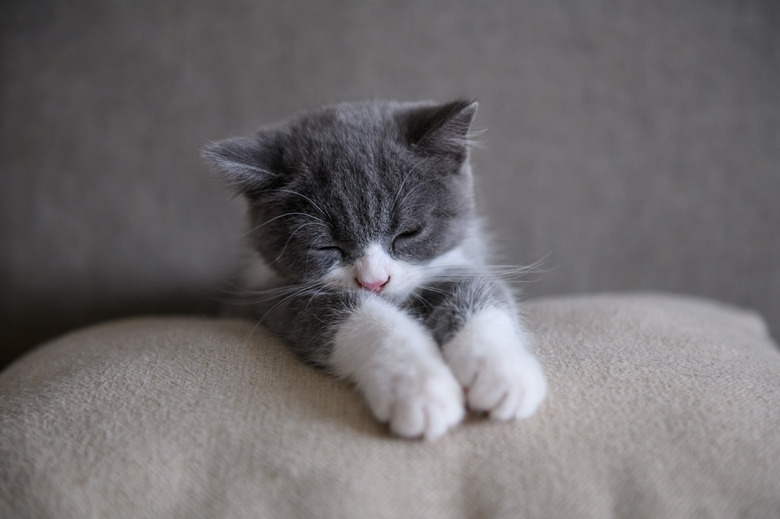Can Cats Get Concussions? Symptoms, Causes & Treatment
"Be prepared." This scout motto is a good one to live by, especially when you have pets. There are times when you may have to take your cat to the emergency veterinarian, so know where the closest facility is and how to get there. If you suspect your cat has a concussion, that's where you should take them immediately.
Concussions in cats
Concussions in cats
A concussion is a form of brain injury. It may prove minor or may be a severe, traumatic brain injury. With the former, cats are masters of deception. Because cats can easily hide symptoms, it's a good idea to get them checked out after any head injury, even if it seems minor.
Cats suffering a mild concussion will likely heal and return to normal. Those with a severe concussion or brain trauma may experience lasting repercussions, especially if they do not receive prompt veterinary care.
Causes of concussions in cats
Causes of concussions in cats
Unsurprisingly, the most common cause of cat concussion involves being hit by a motor vehicle or even a nonmotorized vehicle, such as a bike or scooter. Male cats are often more likely to end up with head trauma because they tend to roam outside more often, especially if they're not neutered.
In cities, many felines suffer head trauma after falling out of apartment windows, which veterinarians refer to as "high-rise syndrome." A climbing cat might fall out of a tree. The truth is that cats don't always land on their feet, especially when falling from great heights.
A cat attacked by a dog might have a concussion from a violent shaking if the dog grabs the cat by the neck. Cats who primarily live outdoors are more vulnerable to concussion, especially if they are intact males roaming in search of mates. However, indoor cats are by no means immune. An object might fall off a table or shelf, hitting the cat in the head.
Someone may accidentally sit on a cat sleeping on a chair or sofa. Kittens or even older cats running around at high speed may charge head first into a solid item. When it comes to potential feline head injuries, the possibilities are endless.
Concussion symptoms in cats
Concussion symptoms in cats
If your cat is unresponsive or experiencing seizures, that's an obvious sign that something is wrong, and may indicate head trauma and concussion. Other obvious signs include facial swelling and bleeding around the nose or mouth. Broken teeth and/or a fractured jaw are also signs of head trauma, but these may not be obvious at home unless you notice your pet is having trouble eating. Looking in the cat's mouth will be part of the exam by your veterinarian. A concussed cat may appear uncoordinated, have difficulty walking, or exhibit other neurological symptom such as being depressed. Your cat's eyes may reflect recent head trauma. If their eyes are moving back and forth in a repetitive manner, or if their pupils aren't the same size, that's a red alert.
However, symptoms of feline head trauma are often subtle. A mild concussion may result in your cat behaving in a way that's just "not quite right." If your cat is behaving oddly, trust your gut and take them to the veterinarian.
While cats suffering a concussion may exhibit various serious symptoms, the loss of consciousness is relatively rare. If a cat does lose consciousness due to head trauma, the prognosis is not good.
Feline concussion treatments
Feline concussion treatments
Your emergency vet will examine your cat to determine the extent of the head injury, looking at their pupils and eye movements and checking for any secondary injuries as well. If the concussion is deemed mild, the veterinarian may prescribe medication for pain management. You'll receive instructions on supportive care and how to monitor your cat's condition. It can take a few weeks for the brain to heal.
If the concussion appears severe, an MRI or CT scan is done. Unlike a simple X-ray study, a CT scan offers a much higher level of detail, creating computerized, 360-degree views. If available, a CT scan is the ideal scan to do within the first 48 hours of head trauma. After that period, an MRI may be more informative. For these procedures, the cat will be given general anesthesia. The cat may receive anti-inflammatory drugs to reduce brain swelling, along with intravenous fluids and medications to aid with neurological issues. Expect your pet to stay in the veterinary hospital for at least a few days, and a follow up visit may be necessary.
Professional monitoring is necessary at this time. It can take months for a cat with a severe concussion to heal. Much depends on the individual animal. While some cats may make a full recovery, others may have permanent neurological impairments. Some cats may also permanently have unequal pupils or one pupil may have an abnormal shape.
The bottom line
The bottom line
A feline concussion should be taken seriously. While many concussions are mild, cats can be good at hiding the extent of their injury, so a trip to the veterinarian is critical. Mild concussions may require pain medications, rest, and careful monitoring. For more serious concussions, a DVM may request an MRI or CT scan. Other possible treatments may include IV fluids, anti-inflammatory drugs or other medications. A hospital stay may also be needed in the case of a severe concussion.


